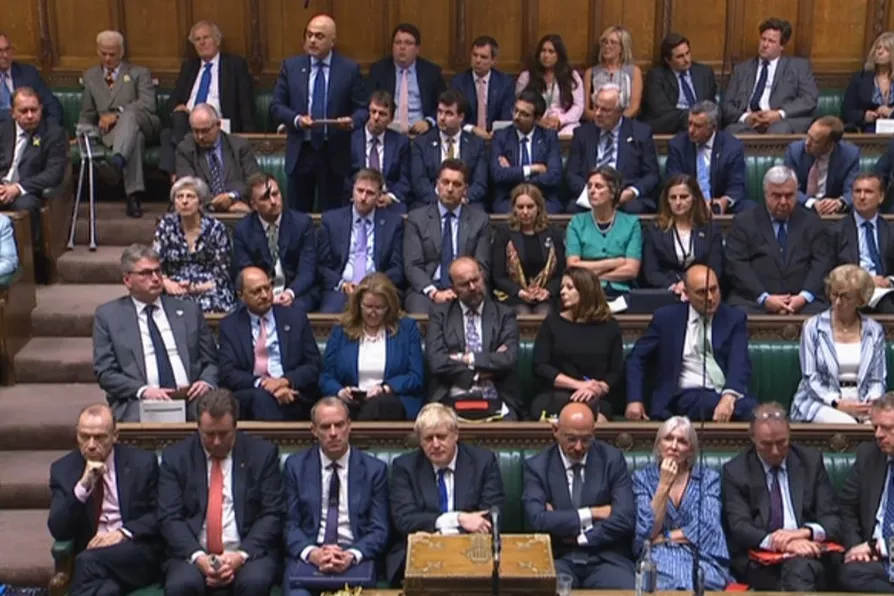
 Boris Johnson's government has passed a law allowing bosses to draft in scab labour
Boris Johnson's government has passed a law allowing bosses to draft in scab labour
THE Conservatives’ bid to undermine the right to strike by allowing bosses to ship in scab labour marks a major escalation of their crackdown on democratic rights.
It also reflects the danger posed by an increasingly unmoored Tory regime pursuing class war beyond the demands of employers themselves in their determination to force pay down across the economy.
Hypocritical ministers who cried crocodile tears when ferry firm P&O illegally fired and replaced hundreds of workers — hiring masked goons to escort them off their ships in handcuffs — are legislating to break the power of organised labour.
This poses obvious safety risks to the public in cases such as the rail industry, where national strike action to defend jobs and secure a real pay rise has prompted this ferocious response.
It goes against what recruitment agencies themselves want, with Recruitment & Employment Confederation chief Neil Carberry having warned: “This is a fundamental change to the regulations that govern recruitment businesses, and the industry is strongly opposed to it ... it puts agencies and agency workers in a very difficult position.”
The government’s defence of the law exposes its complete indifference to the pain inflicted on ordinary households by pay being held below inflation.
Business Minister Jane Hunt accuses unions of “looking to create maximum disruption in a bid to stay relevant” by voting for strikes.
Actually the repeated overwhelming votes to strike among workforces from the railways to telecoms and airports to hospitals reflect a growing determination by workers not to let soaring profit margins pick their pockets. In the words of RMT leader Mick Lynch: “We refuse to be poor any more.”
If unions were out of step with the workforces they represent, they would not be smashing ballot thresholds in dispute after dispute.
And they would not be able to deliver strike turnouts high enough that employers would need to look for scab labour in the first place.
Together with decades of anti-trade union legislation imposed by Tory governments and left in place by Labour ones, this aims at tipping the balance of power at work even further towards bosses.
The ridiculous insistence on postal ballots in an internet age, and the arbitrary turnout thresholds imposed to make failure to vote equivalent to voting against action, are designed to stop strikes.
The ban on solidarity action and the scab charter raced through Parliament — and not opposed by even one of the Tory MPs fancying themselves our next PM — are designed to stop strikes working.
The Tories view them as necessary precisely because workers are standing up and winning on pay. And the way to overcome this latest attack is by redoubling our effort to do exactly that.
The scale of the cost-of-living crisis — with the rising prices of food and energy spelling a sharp decline in living standards for a majority of British households — means unions are winning public sympathy despite our corporate media’s brazen misrepresentation of disputes.
The propagandists who pass for journalists at our major broadcasters were left humiliated in their attempts to poison public opinion against the RMT as no-frills explanation of the reasons workers had been forced to take action resonated across the country.
Initiatives by unions including Unite, the CWU, the BFAWU and the General Federation of Trade Unions to build closer links between unions and community organisations — pioneered by Sheffield trades council and its Sheffield Needs a Pay Rise campaign — can help create a level of local support for disputes that will make employers hesitate to risk the backlash from recruiting scabs.
The threat posed by this law should not be underestimated, but neither should the power of the surge in trade union militancy that it seeks to suppress.
The whole movement can help neutralise this law by coming together in solidarity with every one of the multiplying walkouts hitting both public and private-sector employers.

This May Day we reaffirm our commitment to working people and our class and to get trade unionism back on the front foot, says EDDIE DEMPSEY

RMT leader Eddie Dempsey's stark warning shook up a fringe meeting at the Scottish TUC












